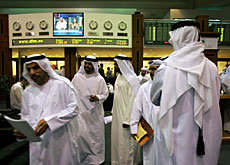swiss banks target muslim investors

Swiss banks, which consider themselves a force to be reckoned with, have been offering Islam-friendly investments for some time.
These adhere to principles found in the Koran and Islamic law (Sharia) referring to ethical loan-lending. Instead of interest, a participation fee dependent on risk is charged.
Usurers – who would lend money at exorbitant interest rates – were already being put in the stocks in Old Testament times and medieval popes banned the charging of interest outright.
The latter is a prohibition, which Islam continues into the present day despite the practice being an everyday occurrence.
But unlike Christianity, Islam has never denied the cost of lending money as the Vatican did in earlier times.
In place of variable interest rates, Sharia law allows the charging of a fee that takes risk – and not external market factors – into account. The purpose of this is to prevent usury.
Islamic finance was a key topic at the fourth Private Banking Summit in mid-2005 in Switzerland.
“We see real opportunities for growth in private banking only in a few parts of the world,” said Walter Knabenhans, board president and CEO of Julius Bär Holding.
“These include the Arabic-speaking Gulf region,” he added.
Strong growth potential
There, wealth management is tied to Sharia principles. Experts estimate that the worldwide market for financial services compliant with Shariah is worth around $300 billion (SFr370 billion).
This equals only ten per cent of the
assets of Swiss banks. However, the forecasted annual growth of this segment is some 15 per cent.
According to Knabenhans, the products and methods of Islamic finance belong to the expertise and repertoire of the modern private banker.
The Koran is a key influence on the Gulf Arabs’ mentality, more so than on other Arabs, according to Jean-Marc Busato, vice-president of Middle East operations with the hotel chain Rezidor SAS Hospitality.
Hailing from Bern, Busato has lived in the Gulf region for 20 years and knows the mentality very well.
“Because the Koran does not provide rules for all civil law
matters, the Sharia exists,” he told swissinfo.
Ban on interest
In the non-secular world of the Middle East, the ban on interest is like the earlier prohibition prevalent in Europe.
“But there are also Islamic principles governing tax and social contributions,” Busato explained.
“Islam substitutes interest with profit and profit-sharing. The international banking world was obviously able to adapt to this way of thinking faster than public opinion in the West.”
Loans are not granted as a credit sum against an interest rate defined
by the market. Instead the money is, in a certain sense, rented out in return for a fee based on risk.
Wealth management is also possible in this way. Investments are only made in institutions and firms, which stick to Sharia principles in their activities and loan-lending. These prohibit investing in businesses relating to weapons, alcohol or gambling.
Many Swiss banks offer such investment possibilities in the Gulf. In 2002 UBS founded a special subsidiary called Noriba in Bahrain. “No Riba” means “no interest” in Arabic. This offers Sharia-compliant financial products to the world.
However, Noriba will be integrated into UBS by the end of 2006, when
all of its products will be directly sold under the UBS brand.
Credit Suisse, Julius Bär and Habib Bank are also represented in the Emirates.
Last winter, Bank Vontobel launched the first ever Sharia-friendly bond in Switzerland.
But it’s not only in credit and wealth management that Islamic variations are blooming – developments are also taking place on the financial markets.
Dubai’s stock exchange approved the listing of the world’s largest debenture bond (or “sukuk” in Arabic), which was worth $3.5 billion.
The debtor is the Dubai Ports, Customs and Free Zone Cooperation, an interesting address given the trade boom and growth in transit within this emirate.
swissinfo, Alexander Künzle in Dubai
The Koran influences the mentality of the population in the Gulf region more than in other parts of the Middle East.
Sharia law interprets Koranic principles for economy and investments.
Loan-lending takes place under certain conditions – the lender enjoys the profit made when the debtor “rents” the loan.
International bankers have cottoned on quickly to the interest in wealth management according to Sharia law and offer such services.
Swiss banks offers such services in private banking but cannot be called Islamic banks.
Only Arab banks or banks from Islamic countries can call themselves Islamic in the United Arab Emirates.
Islamic financial solutions can be offered by non-Arab parties, such as Swiss banks.

In compliance with the JTI standards
More: SWI swissinfo.ch certified by the Journalism Trust Initiative
You can find an overview of ongoing debates with our journalists here. Please join us!
If you want to start a conversation about a topic raised in this article or want to report factual errors, email us at english@swissinfo.ch.